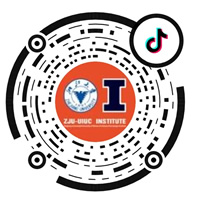In the vast night sky, satellite orbit streaks like shooting stars, carrying pieces of information for people on the ground; liken the scattered candlelight, they illuminate the silent earth. These are miracles in the field of communication technologies, sending voices, texts, and images to distant places, connecting every corner of the world.
On the afternoon of November 3, 2023, Prof. Tony Quek, Fellow of Academy of Engineering Singapore, Head of ISTD Pillar, Director for Future Communications R&D Program in Singapore, IEEE Fellow, was invited to the fourth phase of Juanhu International Academician Lecture Hall. Academician Lee Der-Horng, Dean of ZJUI, presided over the event.
Prof. Tony Quek, with the topic of "Future Non-Terrestrial Networks: Opportunities and Challenges," shared and exchanged ideas with attending faculty members and students on three main issues: "Development History of Non-Terrestrial Networks," "Current Status of LEO Satellite Technology," and "Potential Development Direction of 6G Communication. He detailed the expected network architecture for future non-terrestrial networks, including a transparent transmission architecture mediated by satellites and a relay forwarding architecture on base stations, and delved into the constituent elements of these two architectures.
Prof. Tony Quek also pointed out several challenges faced by non-terrestrial networks, including high propagation delay, high Doppler frequency shift, and additional signal attenuation due to the ultra-long communication distance of satellite links and high-speed movement to the ground. He also presented the latest research results of his research group on satellite link modeling to the attendees.
Finally, Prof. Tony Quek organized the research context of non-terrestrial networks. After considering the evolution route of 3GPP R15-R18 non-terrestrial networks protocol and the JSAT organization's vision for future non-terrestrial networks evolution, he further demonstrated the enormous potential of future non-terrestrial networks and provided prospects for future development.
During the Q&A session, students, ZJUI postdoctoral researchers and professors actively participated in the interactive communication. Prof. Tony Quek conducted exchanges and discussions on relevant academic issues, showcasing his profound professional competence, which expanded the audiences’ knowledge and inspired their own research work.
▲ Q&A session
In this event, Prof. Tony Quek's holistic introduction and interpretation of the future non-terrestrial networks broadened students' horizons and encouraged them to contribute to the development of diversified communication technology in the future.
With the continuous development of technology, we are no longer limited to the limitations of the Earth but embrace a broader universe. This is the case with non-terrestrial communication, which transforms the universe into a bridge for communication between humans. It will bring infinite possibilities and drive research, commercial development, and human exploration forward. Therefore, extending communication to every corner of the world is not only a vision for communication development, but also a responsibility entrusted to us by social progress.
▲ Prof. Tony Quek visited the Smart Urban Future Laboratory







